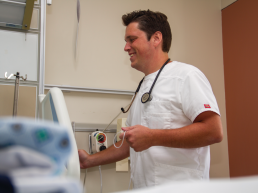Nurses and patient care teams are trained to treat all kinds of physical health problems, both the visible and the invisible. Whether a patient arrives at the hospital with an external injury like a broken bone, dislocated joint, or bruise, or a more internal ailment like an infection, cancer, or chronic pain, nurses are equipped to diagnose the health issue and get their patient on the road to recovery.
But what about health problems that are invisible to the eye and won’t show up on a scan? What happens when a disease affects the mind rather than the body?
Ask any one of our Behavioral Health nurses, and they’ll tell you that health is never just physical. Mental health is an equally important aspect of a person’s overall well-being, and it’s the care that Behavioral Health nurses have committed themselves to.
The Behavioral Health field treats a wide variety of mental health conditions, from autism to schizophrenia, bipolar disorder to depression, eating disorders to substance abuse, and more. Behavioral Health nurses are uniquely equipped to walk with patients through these diagnoses, providing world-class medical care along with support and compassion.
Learn from our Behavioral Health nurses about why they chose this important field, why their work matters, and how they’re working to combat the stigmas that still exist around mental health.
Sarah R.: “I'm there for people in their hardest times.”

Sarah R., Professional Staff Nurse, Behavioral Health
Sarah was drawn to Behavioral Health nursing throughout her nursing school experience, and after a few different career experiences she has decided to go back to school to become a Psych Nurse Practitioner. She has loved being able to continue working at UPMC Western Psychiatric Hospital in a casual role while she completes her degree.
“A lot of times people are afraid when you say you work in inpatient psych; there’s still such a huge stigma with mental health treatment in general. But the skills that you learn of communicating with the patients, talking with them through their hard times, and really being there for them in the hardest times of their lives make it so rewarding, and it really puts things into perspective.
You learn how hard it is to have some of these diagnoses out in the community, how to help patients talk about their diagnosis with family and friends, culture differences in how patients want to be treated, and so much more.”
“The skills that you learn of communicating with the patients ... really being there for them in the hardest times of their lives, make it so rewarding.”
Sarah R., Professional Staff Nurse, Behavioral Health
Krystal B.: “I've gained a better appreciation for people and all their differences.”

Krystal B., Clinician Fellow, Behavioral Health
While Krystal B. always knew that she wanted to be a nurse, her passion for Behavioral Health nursing specifically began during her Behavioral Health rotation in nursing school, when she connected with a mental health patient who she cared for.
“I honestly feel like all nurses should [work in] Psych first,” Krystal said. “You gain a level of level therapeutic communications that you don’t get other places. You gain a better appreciation for people and all their differences when you work in a place like this.”
Ashlee P.: “I knew this was where I wanted to be.”

Ashlee P., Clinician Fellow, Behavioral Health
Ashlee started her career as a milieu therapist, but her time working at Western Psych opened her eyes to both nursing and the Behavioral Health field.
Ashlee said, “I knew this was where I wanted to be. I started to love the hospital setting, and I really liked the work that the nurses did. I never had any experience with autism patients before this, but I walked onto the unit and fell in love with it. I thought, ‘Oh, this is exactly where I want to be.’”
“I never had any experience with autism patients before this, but I walked onto the unit and fell in love with it. I thought, ‘Oh, this is exactly where I want to be.’”
Ashlee P., Clinician Fellow, Behavioral Health
Jennifer A.: “It takes a lot more patience, but you still get that reward of seeing people get better.”

Jennifer A., Clinician, Behavioral Health Aging Adult
Jennifer A. first gained experience working with dementia patients in a previous role at UPMC Presbyterian, and she knew that Western Psych would allow her to continue that experience of caring for the elderly.
“As a nurse, I’ve found that no matter what discipline I’ve been in, it’s rewarding no matter what you’re doing – it’s just different kinds of rewarding. In medical you’re focused on the physical, getting the patient better in that way. Behavioral Health can be challenging in different ways, and I think it takes a lot more patience, but you still get that reward of seeing people get better.”
Bridgett B.: “You won’t find a more supportive place than Psych.”

Bridgett B., Unit Director, Adult Behavioral Health Services
Growing up in a small town where psychiatric issues were common, Bridgett developed an interest in mental health at a young age. As she got older and decided to pursue nursing school, she found herself understanding psychiatric issues more and wanting to help. On the General Adult unit at Western Psych, she gets to do just that.
“Working on our unit is really rewarding,” Bridgett said. “With most acute psychiatric patients, you see a huge change in them during their stay at the hospital. You get to see them get better.”
“You won’t find a more supportive environment than Psych, because that’s what we do: we take care of people.”
Are you looking for a career where you can provide compassionate, life-changing care to a diverse patient population? Click the button to learn more about Behavioral Health nursing roles at UPMC and connect with our team.




